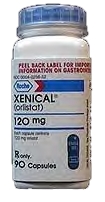 |
In our efforts to provide you with the most comprehensive site possible, we have included various articles relating to Xenical. |
Weight-loss drug has dual benefits for type 2s. (In the Pipeline) Diabetes Forecast v51, n11 (Nov 1998): 35 (3 pages).COPYRIGHT 1998 American Diabetes Association Inc.
Orlistat (Xenical), a weight-loss drug pending approval by the Food and Drug Administration, has been shown to have not one but two major benefits for obese people with type 2 diabetes In a 57-week multi-center study of obese patients with type 2, researchers observed greater weight loss and better glycemic control in patients who took orlistat compared with those who took a placebo (a pill containing no active ingredients).
Of the 254 patients who completed the study, 138 took orlistat and 116 took a placebo. All 254 followed a diet slightly reduced in calories to help them lose weight, and all were controlling their diabetes well with sulfonylurea drugs when the study began.
The difference in weight loss between the two groups became apparent only four weeks into the study. Those who took orlistat lost weight at a faster rate than those who took the placebo. At the end of the study, the orlistat group had lost an average of 13 pounds, compared with an average of 9.5 pounds in the placebo group. The orlistat group also attained lower levels of fasting glucose than the placebo group. As a result, the average dose of sulfonylurea medication decreased more in the orlistat group than in the placebo group. In the orlistat group, 43 percent of the participants decreased the amount of oral sulfonylureas they took, and 12 percent were able to discontinue oral sulfonylureas entirely. In the placebo group, only 29 percent were able to decrease their oral sulfonylurea dose. The researchers believe that the better glycemic control in the orlistat group stems from that group's greater weight loss; weight loss has been shown to improve glycemic control. The orlistat group also had improved serum lipids, with better levels of total cholesterol, lower levels of low-density lipoprotein (LDL, or "bad") cholesterol, and lower levels of triglycerides.
Orlistat belongs to a new class of drugs called lipase inhibitors.Instead of reducing appetite as many diet drugs do, orlistat and the other drugs in its class reduce the amount of dietary fat absorbed in the intestines. If the fat is not absorbed, it will not get into the bloodstream to affect lipid and cholesterol levels. Orlistat is not without side effects, however. The unabsorbed fat passes through the intestines, which can result in gastrointestinal effects ranging from oily stools to fecal incontinence. Moreover, because the fat is not absorbed, fat-soluble vitamins like vitamin E and beta-carotene are not broken down and made readily available for use in the body. The orlistat group did experience a decrease in vitamin E and betacarotene absorption during the study, but the decrease was offset by vitamin supplements.